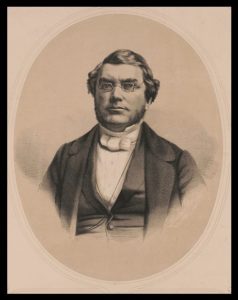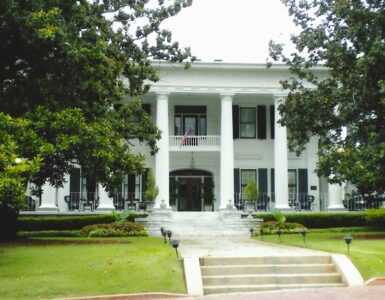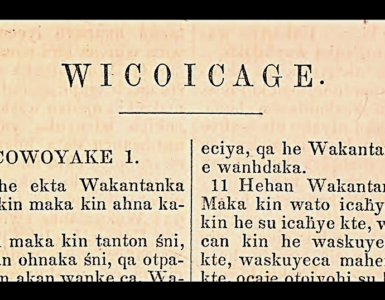 Hagerstown was established by an immigrant named Jonathan Hager from Westphalia in the northwest part of Germany, but before 1814 the village had been named Elizabethtowne for his wife. The property occupied by the German Reformed Church in town was donated by Hager who was killed by a falling beam during construction of the church in 1775. Among the citizens of the tight-knit German community was the owner of the general store and village postmaster, William Krebs, and his wife of English ancestry and Episcopal upbringing, Ann (Adamson) Krebs. The Krebs household worshipped in the German Reformed Church which held services entirely in German until about 1830. John Michael Krebs was born May 6, 1804 into the home of a successful merchant and a devoted mother.
Hagerstown was established by an immigrant named Jonathan Hager from Westphalia in the northwest part of Germany, but before 1814 the village had been named Elizabethtowne for his wife. The property occupied by the German Reformed Church in town was donated by Hager who was killed by a falling beam during construction of the church in 1775. Among the citizens of the tight-knit German community was the owner of the general store and village postmaster, William Krebs, and his wife of English ancestry and Episcopal upbringing, Ann (Adamson) Krebs. The Krebs household worshipped in the German Reformed Church which held services entirely in German until about 1830. John Michael Krebs was born May 6, 1804 into the home of a successful merchant and a devoted mother.
The Krebs directed their son’s general education and spiritual instruction, but it was not until after his father’s death in 1822 that John came to faith in Christ. It seems he was like many youths of his generation because he wanted to be an American, not a German American, and this carried over into his studies as well as church interests. In school, he enjoyed studying the classics, but he enjoyed the English language and its literature thoroughly. In quest of his American identity, he left the German Reformed Church to attend worship in English in the Associate Reformed Presbyterian Church (ARPC). Krebs faithfully attended church yet struggled to understand the Gospel until he read Philip Doddridge’s The Rise and Progress of Religion in the Soul published in 1744. Doddridge’s classic is a guide for directing readers to understanding sin, grace, and growth in sanctification, and this is exactly what the often-reprinted book did for Krebs. At the age of nearly nineteen, Krebs professed faith in Christ and came to believe he was called to the ministry. He joined the ARPC congregation and received counsel regarding the ministry as well as tutoring for college preparation from Rev. John Lind. When Pastor Lind died late in 1824, Krebs was able to study further in an academy in Hagerstown.
Krebs joined the sophomore class of Dickinson College, which at the time was under the presidency of William Neill. He graduated with four others including Richard Armstrong who would become a Presbyterian missionary to the Hawaiian Islands. Krebs needed to study for the ministry so he found a mentor across the square from the college campus in Carlisle at First Presbyterian Church. George Duffield (1794-1868) provided Krebs with a reading list and tested his understanding. A few months after beginning studies with Duffield, he became a teacher in the grammar school at Dickinson for income and continued at the lectern for two years. In October 1829 he completed Duffield’s curriculum and was licensed to preach the Gospel by the Presbytery of Carlisle. He had several opportunities to preach in the numerous scattered churches within the presbytery.
It was his plan to attend Princeton Seminary to study theology further, but the 1829-1830 academic year had just ended, so he took the opportunity as he waited for fall to visit friends in New York. One Sunday a church asked him to fill-in for its absent pastor and among the congregants were some members of the Rutgers Street Church who were impressed with his gifts. Rutgers Street invited him to preach the next week, which he did, and the congregation asked Krebs to supply for two or three months. But the doors of Princeton were about to open for classes, so he made his way to seminary leaving the invitation unanswered. After much anticipation, Krebs attended his first and last lecture at the seminary. No note is provided regarding who the professor or subject was, but he was no longer interested in studying at Princeton Seminary.
Krebs headed to New York and accepted the call issued by the persistent Rutgers Street Church and was ordained by the Presbytery of Carlisle at a meeting in Lancaster, Pennsylvania, November 1830. James Williamson delivered the ordination sermon. The next week he was installed in Rutgers Street Presbyterian Church with a sermon delivered by the pastor of the Duane Street Church, Cyrus Mason. The call of Krebs is an example of one of the problems faced by the Presbyterian Church in the United States of America (PCUSA) at this time which was inadequate and inconsistent education for ministers. The seminary at Princeton was intended to resolve both issues. The difficulty was many students would study for one or two years of the three-year curriculum, then leave because there were churches willing to issue calls despite the fact their candidates had not finished the seminary program. The presbyteries responsible for these churches either did not see a problem or were unwilling to challenge the calls, particularly in the case of large urban churches. It is also curious that Krebs was ordained in a presbytery other than the one responsible for the Rutgers Street Church, which was the Presbytery of New York. But it may have been that Krebs could pass an ordination exam taken before the Presbytery of Carlisle, but would not have been successful if examined by the Presbytery of New York. An examination for transfer was likely not as thorough as one for ordination even though Krebs had been ordained only a week.
What reason might there be for the way the ordination was handled? Possibly, the issue was Krebs’s theological mentor, George Duffield. At the time of Krebs ordination things were heating up for Duffield because of his sympathies for Nathaniel W. Taylor and the New England Theology. Duffield’s views would become commonly available in his book, Spiritual Life: Or Regeneration, 1832. After adjudication in the church courts troublesome times followed for Duffield. The church split with him shortly thereafter leaving. There were now two churches on the Carlisle square—First and Second Presbyterian. Also, at this point in time, the PCUSA would become divided in 1837 into the Old School and New School with one of their points of disagreement the influence of the New England Theology in the denomination. If Krebs had adopted views like Duffield’s and the Rutgers Street Church was sympathetic to those views, then if it may have been questionable for Krebs to sustain examination for ordination by the Presbytery of New York.
One experience of John M. Krebs’s ministry which was both an honor and challenge was serving as moderator of the General Assembly in 1845. For 1845, the commissioners convened in First Church, Cincinnati, Thursday, May 15, at 11:00. The brethren were called to order before retiring moderator George Junkin preached from John 8:32, “The truth shall make you free.” The Stated Clerk reported that the Synod of Buffalo had set off the Presbytery of Buffalo City; the Presbytery of Fort Wayne was established by the Synod of North Indiana; and the Synod of Mississippi created the Presbytery of New Orleans. Once elected moderator, John M. Krebs submitted his resignation as Permanent Clerk after serving eight years. The Synod of South Carolina and Georgia was divided into two synods defined by their state boundaries. An overture from the Presbytery of Ohio asking, “Is Baptism in the Church of Rome valid?” (how often have judicatories dealt with this question) was answered in the negative and Hamilton, Thornwell, and Junkin were appointed a committee to “draw up a minute” about Rome’s baptism. Several memorials on the subject of slavery were grouped together for Overture No. 3 and a committee was appointed to deal with the issue. Included on the committee were “bishops” (the word used in the minutes) Nathan L. Rice, John C. Lord, Alexander T. McGill, N. H. Hall, and Drury Lacy, along with ruling elders Humphrey H. Leavitt and James Dunlap. One interesting visitor was an Iowa Indian chief named Na-che-ning-a. The moderator addressed the chief through a translator and he responded, “in his own tongue.” A collection was gathered totaling 167.84 for the chief to build a house for himself and provide some provisions for his people. The Moderator prayed for Chief Na-che-ning-a.
A controversial issue faced was Archibald McQueen’s memorial to the Presbytery of Fayetteville and his complaint to the General Assembly against the Presbytery of Fayetteville. The issue at hand was concerned with the Westminster Confession 24:4, “The man may not marry any of his wife’s kindred nearer in blood than he may his own, nor the woman of her husband’s kindred nearer in blood than of her own.” McQueen’s complaint was concerned with the extent of discipline exercised against him by Fayetteville Presbytery for marrying his deceased wife’s sister. Similar near-kin marriages occurred throughout the history of the denomination, so the previous General Assembly appointed a study committee to consider revising the Confession by removing the sentence, but when put to a vote, revision was defeated 98 to 83. The Assembly then moved on to consider the extent of the discipline received by McQueen. Papers relevant to the case, from both sides were presented with considerable debate taking place. The Assembly resolved to recommend to the Presbytery of Fayetteville that they reconsider their discipline against McQueen and consider the three years he had been suspended from the ministry to be sufficient. Charles Hodge’s report on the Assembly of 1845 expressed his concern that the marriage issue was dividing the Presbyterian Church and had been doing so for over a hundred years. Further, he said,
The Assembly … has almost always acted upon the principle of neither restoring a man condemned by his session or presbytery for such a marriage, nor coercing the lower courts to make it a matter of discipline.
Hodge concluded that this was an appropriate way to handle such cases and if the issue was pressed to a matter of communion, he believed it would divide the Presbyterian Church. The sentence would eventually be removed in the 1880s by both the PCUSA and the PCUS.
The more historically substantial issue that would predominate in national and church news was slavery as represented in the instruments grouped in Overture 3. The committee appointed had worked through the documents and composed two recommendations. The recommendations reaffirmed that the denomination had historically accepted the existence of slavery as a non-disciplinable practice, to which the committee added that the sense of the instruments combined in Overture 3 calling for discipline of slave holders was divisive of both the Church and the nation and was a path that cannot be followed (p. 18). The committee’s report was adopted and despite the attempt to avoid division of Church and nation, division would come in 1861.
Other issues before the Assembly were reports of the theological seminaries as well as reports from the Foreign Missions Committee. The Assembly adjourned Tuesday, May 27, with the next Assembly to convene in Tenth Presbyterian Church, Philadelphia, the third Thursday of May, A. D. 1846, at 11 o’clock, A. M.
Regardless of the procedure used by John M. Krebs to become pastor of the Rutgers Street Presbyterian Church, he had a fruitful and busy ministry continuing as pastor of the congregation for thirty-eight years ending with his death September 30, 1867. The Rutgers Street Church had 372 members at the time of his death. He was married twice: first, to Sarah Harris Holmes, October 7, 1830, who passed away February 20, 1837; his second marriage was to Ellen Dewitt Chambers, April 10, 1839, who died the spring of 1863. There were two children from the first marriage and several from the second. He was honored with the Doctor of Divinity by his alma mater, Dickinson College, 1841. In 1837 he began service as the Permanent Clerk of the Old School General Assembly continuing until he resigned at the time he was elected General Assembly moderator in 1845. He was clerk of both the Presbytery of New York and the Synod of New York beginning in 1841. It seems ironic that he was chosen a Director of Princeton Seminary in 1842 given his limited class attendance, but he continued on the Board of Directors becoming its President in 1866. He was one of the original members of the Board of Foreign Missions when it was organized by the Old School in 1837 and he remained a member for thirty years. His funeral was attended by a large number of ministers and friends that filled the Brick Presbyterian Church in New York. He is buried in Old Town Cemetery, Newburgh, New York. Pastor Krebs provides a reminder that even in the nineteenth-century the Presbyterians were not only from English speaking countries but also from German. The German Presbyterians were common enough in the Midwest that Dubuque Theological Seminary was founded in 1852 and Bloomfield Seminary was founded in New Jersey in 1869. There were also German editions of Presbyterian publications including the Constitution of the Presbyterian Church. For more information about German Presbyterians, see “German Presbyterians, Adrian Van Vliet, 1809-1871.”
Barry Waugh
Notes—The header shows New York City, circa 1837, and is from the New York Public Library Digital Collection. Krebs’s publications are limited to about a dozen sermons and lectures some of which are available for download on the Log College Press website. The primary source is William B. Sprague’s Discourse Commemorative of the Rev. John M. Krebs, D.D., Albany, 1867. The portrait showing Krebs circa 1850 is from the Library of Congress. The German Reformed Church in Hagerstown is currently named Zion Reformed United Church of Christ. Information about Hagerstown is from “Hagerstown, a History,” on Washington County Historical Society website. Information about Hager and Hagerstown is from, Jonathan Hager, Founder, Revised Edition, by Mary Vernon Mish, Hagerstown: Stouffer Printing Co., 1962. The information on John Lind is from the Associate Reformed Section in vol. 9 of W. B. Sprague’s Annals of the American Associate, Associate Reformed, and Reformed Presbyterian Pulpit, 1869; the book pagination begins anew with each denomination’s ministers and Lind begins on page 129.





